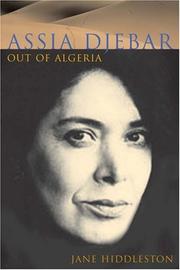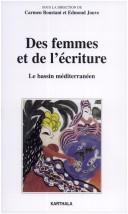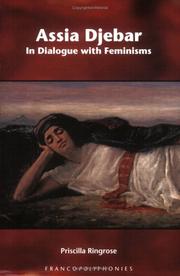| Listing 1 - 4 of 4 |
Sort by
|

ISBN: 1786945347 1846312604 9781846312601 1846316855 9781846316852 1846310318 9781846310317 9781846310237 9781786945341 1429827017 1846310237 9781846310232 Year: 2006 Publisher: Liverpool Liverpool University Press
Abstract | Keywords | Export | Availability | Bookmark
 Loading...
Loading...Choose an application
- Reference Manager
- EndNote
- RefWorks (Direct export to RefWorks)
For more than fifty years, Assia Djebar, Silver Chair of French at New York University and winner of the Neustadt Prize for Contribution to World Literature, has used the tools of poetry, fiction, drama and film to vividly portray the world of Muslim women in all its complexity. In the process, she has become one of the most important figures in North African literature. In Assia Djebar, Jane Hiddleston traces Djebars development as a writer against the backdrop of North Africas tumultuous history. Whereas Djebars early writings were largely an attempt to delineate clearly the experience of being a woman, an intellectual, and an Algerian embedded in that often violent history, she has in her more recent work evinced a growing sense that the influence of French culture on Algerian letters may make such a project impossible. The first book-length study of this significant writer, Assia Djebar will be of tremendous interest to anyone studying post-colonial literature, womens studies or Francophone culture.
Languages & Literatures --- Romance Literatures --- French Literature --- Middle Eastern Languages & Literatures --- Djebar, Assia, --- Jabbār, Āsiyā --- Djebar, Assia --- Djebar, A. --- Imalhayene, Fatma-Zohra --- Criticism and interpretation. --- Algeria --- In literature. --- Algerians in literature. --- Algerian literature (French) --- Women authors --- History and criticism.

ISBN: 2845867468 Year: 2006 Volume: *17 Publisher: Paris Karthala
Abstract | Keywords | Export | Availability | Bookmark
 Loading...
Loading...Choose an application
- Reference Manager
- EndNote
- RefWorks (Direct export to RefWorks)
French literature (outside France) --- Sociology of literature --- Femmes --- Ecrivains --- Méditerranée --- Egypte --- Farhoud, Abla --- Djebar, Assia --- Mokeddem, Malika --- Chedid, Andrée --- Khoury Ghata, Venus --- Gouges, Marie-Olympe de --- Susini, Marie

ISBN: 9401201803 1423790960 9781423790969 9789401201803 9042017392 9789042017399 Year: 2006 Publisher: Amsterdam Rodopi
Abstract | Keywords | Export | Availability | Bookmark
 Loading...
Loading...Choose an application
- Reference Manager
- EndNote
- RefWorks (Direct export to RefWorks)
What are the political implications of an Arab feminist writing practice? How do the works of Assia Djebar, Algeria's internationally acclaimed francophone writer, relate to the priorities and perspectives of both Western and Arab feminist politics? Does Djebar succeed in her aim of reclaiming the history of her homeland, and of her religion, Islam, for women? Or in reclaiming the sexuality of Arab women? In Assia Djebar: In Dialogue with Feminisms , Priscilla Ringrose uncovers the mechanisms of Djebar's revisionary feminism and examines the echoes and dissonances between what Djebar terms her "own kind of feminism" and the thinking of French and Arab feminists such as Irigaray, Cixous, Kristeva, Mernissi and Ahmed. Arguing that Djebar's work is in constant dialogue with other feminisms, Ringrose assesses the strengths and weaknesses of its ideals and identifies their own particular intervention into current political and cultural debates. This book will appeal not only to scholars working on Djebar, but also to students of colonial history, women's studies and cultural politics.
Feminism and literature. --- Feminism in literature. --- Muslim women in literature. --- Women in literature. --- Woman (Christian theology) in literature --- Women in drama --- Women in poetry --- Feminist theory in literature --- Literature --- Women authors --- Djebar, Assia, --- Jabbār, Āsiyā --- Djebar, Assia --- Djebar, A. --- Imalhayene, Fatma-Zohra --- Criticism and interpretation. --- Djebbar, Assia, --- Jabbār, Āsiyā, --- Imalhayene, Fatma-Zohra, --- Literature and feminism
Book
ISBN: 2914935668 9782914935661 Year: 2006 Volume: *5 Publisher: Paris : ADPF,
Abstract | Keywords | Export | Availability | Bookmark
 Loading...
Loading...Choose an application
- Reference Manager
- EndNote
- RefWorks (Direct export to RefWorks)
| Listing 1 - 4 of 4 |
Sort by
|

 Search
Search Feedback
Feedback About UniCat
About UniCat  Help
Help News
News